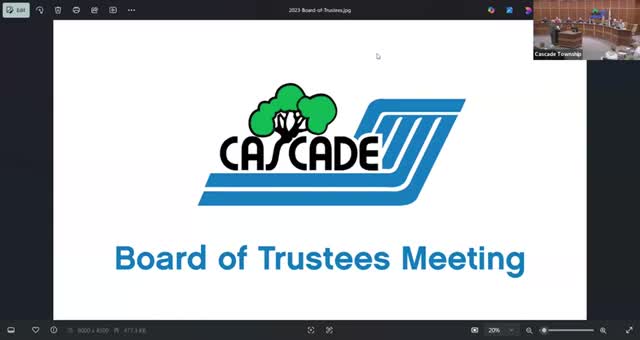Cascade Township introduces major zoning overhaul after extended public comment; board schedules extra work sessions
Get AI-powered insights, summaries, and transcripts
Subscribe
Summary
The Cascade Charter Township Board of Trustees voted 4–3 on Nov. 6 to introduce an amended zoning ordinance for public review and to schedule at least two public work sessions, following more than two hours of public comment that ranged from calls to "slow down the process" to praise for what some speakers called a transparent, multi‑year update.
The Cascade Charter Township Board of Trustees voted 4–3 on Nov. 6 to introduce an amended zoning ordinance for public review and to schedule at least two public work sessions, following more than two hours of public comment that ranged from calls to "slow down the process" to praise for what some speakers called a transparent, multi‑year update.
Supervisor Les Prince framed the proposal as the culmination of a four‑year process tied to the township’s strategic and master plans. "This item is actually the culmination of a process that began over four years ago," Manager Andrew Smith told the room, saying the master plan was adopted in 2024 with "nearly 1,900 responses," and that staff and volunteers had held multiple meetings and published newsletters as part of the outreach.
Why it matters: The draft would consolidate multiple development rules and introduce a form‑based code in a roughly defined village area to guide building scale and ground‑floor commercial activity. Supporters said the update brings the zoning code out of its 1974 origins and targets density to areas with existing water and sewer; opponents said the draft is overly prescriptive and risks limiting property rights and business flexibility.
Public remarks and concerns
Several residents pressed the board to slow the process and provide more targeted information. "I urge you to slow down the process a little bit and make sure that you have a lot of public hearings," said Walter Perschbacher, a long‑time resident.
Mark Anserra, a commercial realtor, called the draft "a huge infringement on property rights" and urged a tabling of the ordinance, citing perceived lack of notice to business owners. "Table the process. If there's a vote today, you will have anarchy on your hands," he said.
By contrast, longtime resident and planner Scott Van Salcoma praised the outreach: "This entire process has been thoughtful, transparent, and built on real community input," noting earlier surveys and presentations that staff said informed the draft.
Several speakers urged more housing choices for young adults and seniors. "There are almost no affordable options here," said a recent graduate, Zoe, describing difficulty finding starter housing in Cascade.
Staff explanation and board responses
Planning Director Andrea Hendrick and Manager Andrew Smith repeatedly told the public that the draft was intended to be infrastructure‑aware: higher residential density is proposed along the 28th Street corridor and in defined overlays where sewer and water exist, while most rural areas east of the airport were left largely unchanged.
Hendrick said most residential lot‑area and lot‑width rules were retained, accessory‑unit size limits were increased and made less subjective, and the form‑based code would emphasize building scale and keeping first floors commercial in the village area.
Key numeric clarifications discussed in the meeting included: the draft document length (252 pages); outreach counts (about 1,900 responses); the number of meetings cited by staff (28 meetings total, including board work sessions and public hearings); the private‑street proposal changes (width increased from 18 to 22 feet and the draft limits private drives to a maximum of 8 homes in some cases); and proposed residential densities in selected overlays (a stated base of 12 units per acre with bonus opportunities up to 18–20 units per acre in specified districts).
Board action and next steps
A motion to postpone consideration for six months, add an economic analysis and hold additional education sessions failed. The board then approved a resolution to formally introduce the amended zoning ordinance (not adoption) and to hold at least two public work sessions to walk through the draft. The introduction passed on a roll call, four votes in favor and three opposed.
Trustee Shipley moved to introduce the ordinance, and the motion passed 4–3 on a roll call; the recorded majority and minority positions were reflected in the meeting minutes.
What remains unresolved
Speakers and board members proposed several follow‑up steps: (1) targeted education sessions and Q&A workshops to help residents and business owners understand parcel‑level impacts, (2) a clearer, single summary of changes on the township website, and (3) the option to pause applications in limited cases while the ordinance is under consideration — legal counsel said a temporary moratorium in the 4–6 month range is generally defensible in most circumstances.
The board directed staff to schedule public work sessions and to continue accepting feedback. The introduced ordinance remains a draft until the board votes on adoption at a future meeting.
Quote attribution: Public comments and board statements in this article are verbatim excerpts from the Nov. 6, 2025 Cascade Charter Township meeting transcript and are attributed to the speakers listed below.
